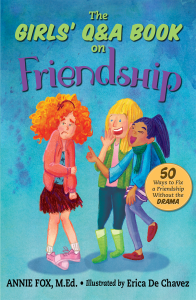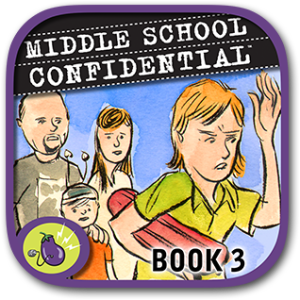|
|
February 7, 2016
Hey Terra!
I’ve been experiencing some moral differences with my parents. I’ve always idolized my them, but recently, I’ve realized I simply can’t agree with some of their ideas.
On a recent trip we took public transportation and most of the people riding with us were African Americans. My mom kept whispering derogatory racist remarks to me and my sister. And just a few days ago, my mom argued that a person’s skin color and other aspects of appearance are a direct link to the quality of the person.
I love my parents, but it makes me confused when I disagree so vehemently with people I care about. Racism is a big issue and I hate to see my parents contribute to it.
How should I respond when they bring up or argue this topic again? Is debating with them a viable solution? – Confused
 Talk to the hand. I am very proud of you for recognizing racist remarks when you hear them and knowing it’s not ok to talk like that. Even if these remarks come from someone you love and idolize (like your parents) a racist comment is still a racist comment! You’re right. Racism is a big issue and you have chosen to be part of the solution, not the problem. I admire you for taking that role.
So how should you respond when parents try to argue their ignorant perspective? Great question! To discover the answer you first need to examine the answer to this question: “When it comes to other people’s attitudes, opinions, feelings, thoughts and behavior what power do I have?” You sound like an extremely intelligent individual so you probably don’t need me to tell you that you have no power over what others think or feel or do. Zero. But you do have 100% control over your own behavior.
Because you are uncomfortable with hate speech, you can simply hold up your hand and say to your parents, “Stop. I don’t want to hear this kind of talk.” You can do that with conviction, but without rudeness or anger. You have the right to respectfully set boundaries for their hate speech in your space. Will this change your parents’ attitudes about people who are different from themselves? Not likely, but at least they will know it is not OK with you to speak this way in front of you.
Your thoughts?
In friendship,
Terra
Hi Terra,
I’m so grateful to know there is a reasonable way to stop these conversations when they start without adding fuel to the fire. Thanks again! – Less Confused
Glad to help.

April 23, 2015
 A Good Use of Power In our 40 years together, David and I have read many books. Add another hundred or so books on tape we’ve consumed on road trips. Yep, we’re addicted to good stories. So it wasn’t too weird when, after a business trip to Florida and a side trip to Universal’s Wizarding World, we decided to re-read all the Harry Potter books… aloud… to each other.
Starting in mid-December, I’d read a couple chapters over breakfast each morning. At dinner, with wine and candlelight, I’d read another chapter or so. If we were driving for more than 20 minutes in any direction, I’d read aloud in the car. (Yes, I can do that without barfing. Lucky me.) At the end of each day we’d watch the film adaptation of the current book, making sure to stop when we got to a new part (i.e., a section of film we hadn’t yet read.)
To date we’ve completed six books and six films. (When we get into something we really get into it.) We’re now half-way through Book 7.
Ever since the kids of Hogwarts took their education into their own hands, I’ve been thinking about the Dark Arts as it relates to the dark side of humanity. While we rarely hear about jinxes or debilitating spells, we’re plenty aware of public humiliation and shaming in social media. Character assasination is a curse, high on the list of Dark Arts. So how do we defend ourselves against the real and present danger of social garbage? How do we teach our kids to defend themselves, online and off, from the hostility of their peers? Where is Harry Potter when we need him?
When I think about what it means to defend oneself, I picture someone standing up for their rights or the rights of others and actively fighting back against the vitriol. But there is inherent danger when one uses vitriol to fight vitriol. The weapon we use has the power to infect us and make us more and more like the perpetrators we seek to vanquish. We can so easily become the enemy. Doing the right thing in a good way isn’t easy.
How do you help your children defend themselves against the prevailing Culture of Cruelty? How do you teach them not to succumb to its ways? Post here and let’s get into it. You can also follow my tweets at @Annie_Fox and @GirlDramaChat. Every Friday you can join the conversation as I host #girldramachat, a weekly Twitter chat (11AM PST) to help parents/teachers/counselors support girls thru friendship drama w/compassion, respect & social courage.

October 22, 2014
As some of you know, I’m currently on a blog tour to spread the word about The Girls’ Q&A Book on Friendship: 50 Ways to Fix a Friendship without the DRAMA. If you are female (any age), and/or if you are raising a daughter, teaching or coaching girls or you’ve got a sister, a niece, etc., I’m guessing you know about girls’ friendship DRAMA. Destructive lunacy, right?
 The Girls’ Q&A Book on Friendship empowers girls to make choices they feel good about. For the next several weeks, I’ll be highlighting some of the friendship questions my gracious blog tour hosts tossed in my direction as I stopped at their site. No softballs here!
This question comes from the dynamic educator and psychologist, Louise Masin Sattler ( @LouiseASL )
Louise: Do you think we are making strides in reducing bullying in the schools? And are girls worse than boys with bullying?
Annie: Yes, of course we are making strides. Yippee! Progress should be celebrated. Are those strides being made universally? No. Is the progress happening quickly enough? Hell no! There are still many schools where teachers bully students and where teachers turn a blind eye and a deaf ear to students making sexist, homophobic, and racially-charged comments to other students. There are still school administrators who shrug and tell distraught parents of targeted students, “Kids will be kids.” or “Teen girls are just mean. What are you going to do about it?” (Actual statements made by school administrators as reported to me by extremely frustrated parents.)
Are girls “worse” than boys with bullying? I don’t believe so. Both girls and boys are afflicted by Peer Approval Addiction in equal measure. Both genders struggle to do the right thing while simultaneously feeling compelled to do whatever it takes to fit in… including stuff they aren’t particularly proud of. The difference, if it exists at all, may be in the methodology girls and boys use to “take down” peers, online and off. That said, the seeds of compassion and empathy are equally prevalent in boys and girls. So, even though I wrote this book for girls, both boys and girls need to understand that their choices matter… in peer relationships and in life.
Read more of Louise’s Q’s and my A’s at LouiseSattler.me

August 14, 2014
Your Mom sees one dirty spoon on the sink counter and starts yelling. You politely ask Dad for movie money and he walks past you muttering something about “…growing on trees.” You excitedly tell your daughter, “Keep Saturday open, sweetie, we’re going…” but before you finish, she bursts into tears. Your son is nothing but rude to his little brother and when you try to reason with him he loudly accuses you of not loving him.
 What’s up with my family? There’s an app for that! Later you sit at the dinner table. No one talks or even looks at each other. Yet you’re all connected by a silent question: “What’s up with my family?!”
What’s that you say? Never wondered about that? Bolderdash! For centuries parents and kids have asked themselves “What’s up with my family?” Now, finally, here in the glorious Digital Age, there comes an app with some answers!! I know it’s good, because I wrote it. But don’t just take my word for it, here’s what Carisa Kluver of Digital Storytime has to say:
“Fox covers issues that range from over-protective parents to abandonment and loss deftly in this graphic novel for readers 10 and up. What’s Up with My Family? is a book app with brilliant storytelling, movie-quality sound effects and seamlessly integrated features. Electric Eggplant has set the gold standard for presenting graphic novels in the digital realm. My highest recommendation!”
Bolderdash aside, when it comes right down to it, we love our family. We really do! And sometimes they drive us nuts. Without doubt, we sometimes do our part to drive them nuts too. Even though all families are different, they all have ups and downs.
This is an app for every kid (and parent) who’s ever wondered, “What’s Up With My Family?” It may help you understand the people in your family better. It may also help you use your power to improve things at home. Sometimes you can do that by talking about how you feel. Sometimes, change happens when you shift your attitude and decide to be more cooperative.
Get it now, for your family and you might start talking and laughing at dinner again.
(Press release can be viewed here.)

| |















“My parents are racist!”
February 7, 2016
Talk to the hand.
I am very proud of you for recognizing racist remarks when you hear them and knowing it’s not ok to talk like that. Even if these remarks come from someone you love and idolize (like your parents) a racist comment is still a racist comment! You’re right. Racism is a big issue and you have chosen to be part of the solution, not the problem. I admire you for taking that role.
So how should you respond when parents try to argue their ignorant perspective? Great question! To discover the answer you first need to examine the answer to this question: “When it comes to other people’s attitudes, opinions, feelings, thoughts and behavior what power do I have?” You sound like an extremely intelligent individual so you probably don’t need me to tell you that you have no power over what others think or feel or do. Zero. But you do have 100% control over your own behavior.
Because you are uncomfortable with hate speech, you can simply hold up your hand and say to your parents, “Stop. I don’t want to hear this kind of talk.” You can do that with conviction, but without rudeness or anger. You have the right to respectfully set boundaries for their hate speech in your space. Will this change your parents’ attitudes about people who are different from themselves? Not likely, but at least they will know it is not OK with you to speak this way in front of you.
Your thoughts?
In friendship,
Terra
Glad to help.